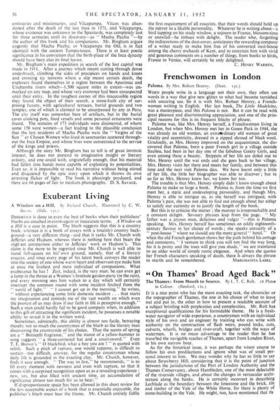Exuberant Living
DISSERVICE is done to even the best of books when their publishers' blurbs are couched in extravagant or inaccurate terms. A Window on a Hill is a case in point. The blurb suggests that this is a Country book, whereas it is a book of essays with a (mainly) country back- ground—a very different thing—and that it ranks Mr. Church with Jefferies and Hudson, whereas there is nothing here that bears the sligh'est comparison either to Jefferies' work or Hudson's. This claim is the more to be regretted since Mr. Church is well able to stand full-square on his own ground, namely, that of a literary essayist, and since every page of his latest book conveys the reader into the society of one whose warm heart and observant eye make him at once the liveliest and most individual of companions. What exuberance he has ! Zest, indeed, is the very man; he can even get a lump in the throat at a Women's Institute garden-party (in the rain), and every morning sees him waken to a day which will certainly interrupt the common round with some incident fetched from the " world of light." " I cannot get up in the morning," he writes, " without experiencing some little domestic incident . . . that starts my imagination and reminds me of the vast wealth on which even the poorest of us may draw if our faith in life is perceptive enough." Such a man could hardly fail to be good company when, in addition to this gift of attracting the significant incident, he possesses a notable ability to reveal it in the written word. Sometimes, admittedly, this ability is almost too facile, betraying thereby not so much the countryman of the blurb as the literary man discovering the countryside of his choice. Thus the scents of spring are a" Botticelli fragrance," and the stance of a yellow-hammer in song suggests "a three-cornered hat and a court-sword." Even T. E. Brown's" 0 blackbird, what a boy you are ! "is quoted with relish. Such a pitch of rapture, one would suppose, is difficult to sustain—too difficult, anyway, for the regular countryman whose daily life is grounded in the exacting clay. Mr. Church, however, finds it easy enough. "The way to live," he recommends, "is to fill every moment with newness and even with rapture, so that it comes with a surprised recognition upon us as a revealing experience : new, yes, but also filled with ancient time, an accumulation of significance almost too much for us to bear." If disproportionate space has been allowed in this short review for the less acceptable aspect of a book that is essentially enjoyable, the publisher's blurb must bear the blame. Mr. Church entirely fulfils the first requirement of all essayists, that their words should hold up the mirror to a likable personality. Whatever he is writing about—a bird tapping on his study window, a sojourn in France, blossom-time or snowfall—he imbues with delight. The reader who, forgetting the indiscretions of the dust-cover, anticipates the rewarding company of a writer ready to make him free of his converted oast-house among the cherry orchards of Kent, and to entertain him with vivid and generous comments on a number of things, from books to birds, France to Venice, will certainly be only delighted.
C. HENRY WARREN.


































 Previous page
Previous page